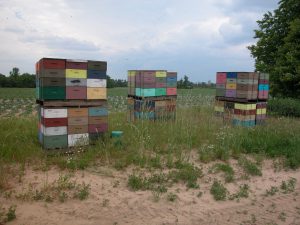Does a pesticide applicator need to notify beekeepers when applying a pesticide? That depends on these three factors: the specific pesticide being applied, the distance to the bee yard, and whether or not the beeyard is registered with the NJDEP.
 The NJ Pesticide Control Regulations, at NJAC 7:30-9.11, require that beekeepers must be notified when pesticides that are labeled as hazardous to bees are applied within three miles of a registered beeyard. Not all pesticide applications require notification. The types of pesticide applications exempt from this notification are spelled out in the regulation.
The NJ Pesticide Control Regulations, at NJAC 7:30-9.11, require that beekeepers must be notified when pesticides that are labeled as hazardous to bees are applied within three miles of a registered beeyard. Not all pesticide applications require notification. The types of pesticide applications exempt from this notification are spelled out in the regulation.
This requirement to notify beekeepers is mandatory for the pesticide applicator (if the application meets the 3 factors), but it is up to each individual beekeeper to register their beeyard locations on a voluntary basis if they wish to be notified of pesticide applications that state the product is harmful to bees. Beeyards must be registered by March 1st each year to be included on the NJDEP notification list. There is no limit on the number of beeyards that can be registered by a beekeeper.
Notification by the applicator is required at least 24 hours before application via telephone, in person, by regular or certified mail with sufficient lead time to arrive the day prior to the application, by facsimile (fax) or e-mail. The notification shall include the following information:
1. The intended date of the application;
2. The approximate time of the application;
3. The brand name and active ingredient of the pesticide to be applied;
4. The location of the land on which the application is to be made; and
5. The name and certified pesticide applicator license number of the responsible pesticide applicator.
For the following flowering crops, beekeeper notification applies within these dates or when the crop is in the flowering stage:
1. Apples April 15 to May 15
2. Pears April 15 to May 15
3. Strawberries April 15 to May 15
4. Peaches April 15 to May 15
5. Blueberries April 15 to May 15
6. Cranberries June 15 to August 15
7. Holly June 1 to June 30
8. Vine Crops (Cucurbits) June 1 to August 31
9. Sweet Corn Flowering Stage
10. Cover crop or weeds Flowering Stage
The List of Officially Registered Beeyards is compiled every year and is available online. A beekeeper is sent a list of the beeyards he had registered for the previous year so that a decision can be made on whether or not to register those sites again for the current year. If a beekeeper wishes to register any new beeyards, the “Beeyard Registration Form” can be downloaded from the NJDEP, completed and either mailed to the address indicated or emailed to Joanne.Taroco@dep.nj.gov.
Both farmers and beekeepers realize the benefits bees bring to crops and the environment. By working together and following this notification process, both parties help to reduce risks to beeyards.

